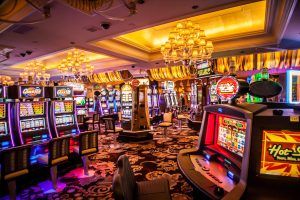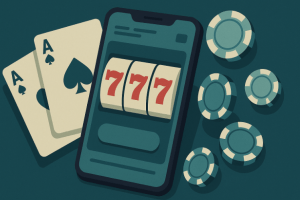Despite many cultural and economic similarities, the Scandinavian countries Norway, Sweden, and Denmark have some areas where they differ greatly. And one such area is when it comes to gambling. With distinctly different regulatory models, players in these countries do not have the same starting point for land-based and online gambling. Here we take a closer look at the current state.
Norway: Monopolized but Borderless
Norway is generally seen as the strictest of the Scandinavian trio when it comes to gambling regulation. That’s because the state retains a firm grip on the market, with a long-standing monopoly model in place. The only two entities legally allowed to offer gambling services, land-based or online, are Norsk Tipping and Norsk Rikstoto – both state-owned.
Outside of a handful of licensed betting shops and lottery terminals, there are no land-based casinos in Norway. The country banned slot machines back in 2007, replacing them with tightly controlled video lottery terminals (VLTs). Norsk Tipping controls this and other gambling offerings like scratch cards, lottery, and some online gambling alternatives.
The strict regulatory model is supposedly built around consumer protection. The Norwegian government argues that tight control helps prevent problem gambling, money laundering, and underage access. Norsk Tipping even incorporates mandatory loss limits and cooling-off periods for players. In order to even gain access, Norwegians have to sign up using BankID to confirm they are who they are, with no exceptions.
Despite these restrictions, the Norwegian monopoly is not bulletproof. Since Norway is part of the European Economic Area (EEA), Norwegians can legally access online casinos based in other EEA jurisdictions, like Malta or Gibraltar, under the principles of free movement of services. Due to this, it is completely legal and possible for Norwegians to compare the best Norwegian online casinos and find an offshore-based alternative they can sign up and play at.
While the government prohibits foreign operators from advertising their services to Norwegians and tries to block transactions to foreign online gambling platforms, enforcement has proven tricky. In practice, many Norwegians bypass restrictions by using VPNs, foreign payment methods, or crypto. While this gray market isn’t exactly encouraged, it’s also not illegal for players to participate. That creates a strange duality: a restrictive legal framework that coexists with a thriving offshore casino market.
Sweden: From Monopoly to Market
Sweden once shared a similar monopoly model with Norway. For decades, Svenska Spel, the state-owned operator, held exclusive rights to offer most forms of gambling. But mounting pressure from the EU, combined with the rapid rise of offshore operators, led to a major shift in policy.
In January 2019, Sweden officially opened its gambling market to private competition. The new Swedish Gambling Authority (Spelinspektionen) began issuing licenses to operators, but with strict criteria to ensure responsible gambling. Licensed operators must integrate tools like Spelpaus, a nationwide self-exclusion register, and comply with rules around advertising and bonus limits. The licensing model can remind of the UK (with the UK Gambling Commission), with a clear focus on compliance and player safety through strict guidelines.
The goals of introducing this licensing model were clear: to protect consumers, channel traffic to regulated operators, and collect tax revenue (18% on gross gaming revenue). While there is still a market for unregulated or “offshore-based” casinos for Swedish players looking for fewer restrictions, the reform has overall resulted in a clearer structure and control.
Still, updates are needed to adhere to the developing market, and not everything is going as smoothly in this Scandi country either. When it comes to land-based gambling, the country has seen a similar monopoly structure where Svenska Spel’s Casino Cosmopol has been the sole operator of land-based casinos in the country. In April 2025, the government decided to officially end land-based gambling in Sweden, as the land-based casinos “no longer served their purpose”, citing declining foot traffic, high operational costs, and a shift in consumer habits toward online gaming. This move underscores Sweden’s increasing focus on digital regulation, but has sparked conversations about whether a more open approach to land-based gambling with healthy competition could have saved the market.
Denmark: A Balanced Ecosystem
If Sweden’s shift to licensing was a response to external pressure, Denmark took a more proactive and pragmatic route. Already back in 2012, the country liberalized its gambling market with the introduction of the Danish Gambling Act. This reform allowed private operators to apply for online casino and sports betting licenses under the supervision of the Danish Gambling Authority (Spillemyndigheden) – like the Swedish model and the UK and others before then.
What sets Denmark apart from its neighbouring countries is the relative stability and success of its regulatory model. The country boasts one of the highest channelization rates in Europe, meaning that most players gamble through licensed and regulated platforms. This has led to effective oversight, better consumer protection, and consistent tax revenues (20% of gross gaming revenue for online betting and casino).
The Danish authority has also embraced technology. Tools like ROFUS (a national self-exclusion database) and NemID (a government-backed electronic ID system) help ensure that gambling remains responsible and secure. The country has also cracked down on unlicensed advertising and even blocked the IPs of illegal operators where needed.
In addition to the online market being pretty unproblematic, the land-based market is also doing well. Unlike Sweden, Denmark is not moving away from its modest land-based casino industry. There are currently several licensed casinos and slot machine venues across the country, all under strict regulation. However, land-based gambling accounts for a much smaller share of the market, with online casinos and sports betting dominating in terms of revenue and player engagement.

What About Finland?
While Finland is often mentioned in the same context as Sweden, Denmark, and Norway, it is not part of Scandinavia. Still, it borders two of the countries and generally has a lot of similarities, making it interesting to compare in this context.
Finland has long operated under a state monopoly model, much like Norway. The sole operator, Veikkaus, is state-owned and controls all legal gambling: lotteries, betting, casinos (including online), and slot machines. However, Finland is currently in the process of reforming this monopoly. In 2023, the Finnish government announced its intention to introduce a licensing system by 2026, aligning more closely with the Swedish and Danish models.
If or once this new regulation is introduced, Norway will be the only remaining country with a state monopoly. The question therefore remains whether Norway will follow in the footsteps of its neighbouring countries, or stick with the strict monopoly regulation – even though the reasonings of responsible gambling might not be enough to keep players happy anymore.
Conclusion
Despite their shared culture and high standards of governance, Norway, Sweden, and Denmark have taken very different paths in regulating online gambling:
- Norway sticks to a strict monopoly, though many players prefer the loophole of offshore-based gambling.
- Sweden embraced liberalization in 2019, opening its market while maintaining tight controls.
- Denmark led the way with early reforms and now enjoys a stable, well-regulated market with high compliance rates.
These varying models reflect not just policy preferences but deeper national attitudes toward risk, individual freedom, and state responsibility. Yet across all three nations, there’s a clear emphasis on responsible gambling, consumer protection, and technological integration.






 Your total news and information resource for all things Science, Technology, Engineering / Mathematics, Art, and Medicine / Health.
Your total news and information resource for all things Science, Technology, Engineering / Mathematics, Art, and Medicine / Health.
Leave a Comment